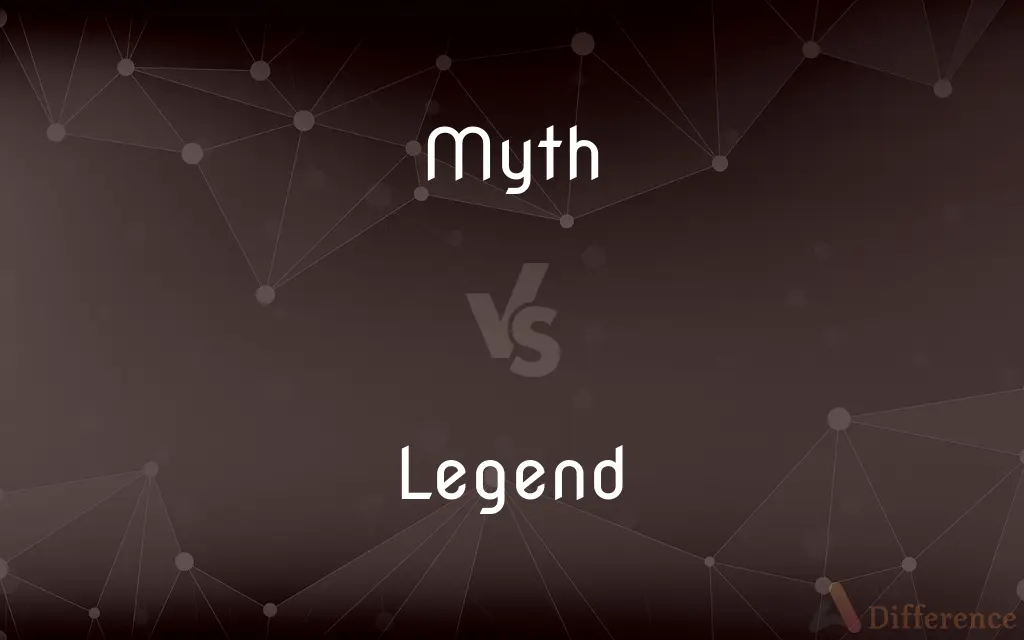Myth vs. Legend — What's the Difference?
By Tayyaba Rehman & Urooj Arif — Updated on March 27, 2024
Myth is a traditional story explaining natural or social phenomena, often involving gods or supernatural beings. Legend, on the other hand, is rooted in historical fact but embellished over time, focusing on heroes or events.

Difference Between Myth and Legend
Table of Contents
ADVERTISEMENT
Key Differences
Myths serve as foundational narratives that often explain the origins of the world, the existence of gods, and the reasons behind natural phenomena, reflecting the beliefs and values of a culture. Whereas legends, although they may contain supernatural elements, are primarily concerned with human heroes, historical events, or cultural morals, and are told as if they are true, even though their factual accuracy is uncertain.
Myths are integral to understanding the worldview and religious beliefs of ancient civilizations, as they were often part of ritual practices and served to justify social or natural orders. Legends, on the other hand, frequently celebrate the deeds of ancestors or heroes, aiming to inspire, teach moral lessons, or instill a sense of cultural identity.
The characters in myths are usually gods, goddesses, or supernatural beings with powers that influence the human world and nature. In contrast, legends focus more on humans or human-like characters who achieve extraordinary feats, often with the help of or in conflict with supernatural forces.
Myths often take place in a timeless, primordial past, setting the stage for the world as it is known. Legends, however, are usually set in a more identifiable historical period, though they may be significantly embellished or romanticized over time.
The purpose of myths is primarily to explain the unexplainable and to convey religious or spiritual truths through metaphorical or symbolic narratives. Legends, while they may also aim to explain mysteries, are more focused on telling stories of moral integrity, bravery, or historical importance, often with a stronger emphasis on entertainment.
ADVERTISEMENT
Comparison Chart
Definition
A traditional story about gods or supernatural beings.
A semi-true story, with factual basis, but embellished over time.
Main Characters
Gods, goddesses, supernatural entities.
Heroes, historical figures.
Purpose
Explains natural/social phenomena and religious beliefs.
Celebrates heroism, moral lessons, or cultural identity.
Setting
Often a primordial or timeless past.
Set in a more identifiable, often historical, period.
Relation to Truth
Generally symbolic or metaphorical, not meant to be factual.
Rooted in historical fact, but details are often fictionalized.
Compare with Definitions
Myth
A story about the origins of the Earth.
The myth of Gaia explains how the Earth came to be.
Legend
Stories of historical heroes exaggerated over time.
The legend of King Arthur tells of a British king and his noble knights.
Myth
Tales involving gods or supernatural beings.
In Norse mythology, Thor is the god of thunder.
Legend
Narratives with a basis in historical fact.
Legends of Robin Hood originated from tales of an actual medieval outlaw.
Myth
Narratives explaining natural phenomena.
Ancient myths often personified the sun and moon as deities.
Legend
Tales meant to inspire or teach moral lessons.
The legend of William Tell showcases the value of courage and skill.
Myth
Symbolic stories conveying spiritual truths.
The myth of Prometheus explains the origin of fire and human ingenuity.
Legend
Accounts celebrating cultural identity.
The legend of the Minotaur reflects Crete's ancient civilization and rituals.
Myth
Foundation of religious beliefs in cultures.
Egyptian myths were integral to their religious practices and afterlife beliefs.
Legend
Semi-true stories passed down through generations.
Legends of the American frontier often exaggerate the exploits of explorers.
Myth
Myth is a folklore genre consisting of narratives that play a fundamental role in a society, such as foundational tales or origin myths. The main characters in myths are usually non-humans, such as gods, demigods, and other supernatural figures.
Legend
A legend is a genre of folklore that consists of a narrative featuring human actions perceived or believed both by teller and listeners to have taken place within human history. Narratives in this genre may demonstrate human values, and possess certain qualities that give the tale verisimilitude.
Myth
A traditional, typically ancient story dealing with supernatural beings, ancestors, or heroes that serves as a fundamental type in the worldview of a people, as by explaining aspects of the natural world or delineating the psychology, customs, or ideals of society
The myth of Eros and Psyche.
A creation myth.
Legend
An unverified story handed down from earlier times, especially one popularly believed to be historical.
Myth
Such stories considered as a group
The realm of myth.
Legend
A body or collection of such stories.
Myth
A popular belief or story that has become associated with a person, institution, or occurrence, especially one considered to illustrate a cultural ideal
A star whose fame turned her into a myth.
The pioneer myth of suburbia.
Legend
See urban legend.
Myth
A fiction or half-truth, especially one that forms part of an ideology.
Legend
One that inspires legends or achieves legendary fame
She is a legend in her own time.
Myth
A fictitious story, person, or thing
"German artillery superiority on the Western Front was a myth" (Leon Wolff).
Legend
An inscription or title on an object, such as a coin.
Myth
A traditional story which embodies a belief regarding some fact or phenomenon of experience, and in which often the forces of nature and of the soul are personified; a sacred narrative regarding a god, a hero, the origin of the world or of a people, etc.
Legend
An explanatory caption accompanying an illustration.
Myth
(uncountable) Such stories as a genre.
Myth was the product of man's emotion and imagination, acted upon by his surroundings. (E. Clodd, Myths & Dreams (1885), 7, cited after OED)
Legend
An explanatory table or list of the symbols appearing on a map or chart.
Myth
A commonly-held but false belief, a common misconception; a fictitious or imaginary person or thing; a popular conception about a real person or event which exaggerates or idealizes reality.
Scientists debunk the myth that gum stays in the human stomach for seven years.
Legend
An unrealistic story depicting past events.
Myth
A person or thing held in excessive or quasi-religious awe or admiration based on popular legend
Father Flanagan was legendary, his institution an American myth. (Tucson (Arizona) Citizen, 20 September 1979, 5A/3, cited after OED)
Legend
A story of unknown origin describing plausible but extraordinary past events.
The legend of Troy was discovered to have a historical basis.
Myth
A person or thing existing only in imagination, or whose actual existence is not verifiable.
Legend
A plausible story set in the historical past, but whose historicity is uncertain.
The legend of Robin Hood
Myth
An invented story, theory, or concept.
Legend
A story in which a kernel of truth is embellished to an unlikely degree.
The 1984 Rose Bowl prank has spawned many legends. Here's the real story.
Myth
A story of great but unknown age which originally embodied a belief regarding some fact or phenomenon of experience, and in which often the forces of nature and of the soul are personified; an ancient legend of a god, a hero, the origin of a race, etc.; a wonder story of prehistoric origin; a popular fable which is, or has been, received as historical.
Legend
A fabricated backstory for a spy, with associated documents and records.
According to his legend, he once worked for the Red Cross, spreading humanitarian aid in Africa.
Myth
A person or thing existing only in imagination, or whose actual existence is not verifiable.
As for Mrs. Primmins's bones, they had been myths these twenty years.
Legend
A person related to a legend or legends.
Myth
A traditional story accepted as history; serves to explain the world view of a people
Legend
A leading protagonist in a historical legend.
Achilles is a legend in Greek culture.
Legend
A person with legend-like qualities, such as extraordinary accomplishment.
Michael Jordan stands as a legend in basketball.
Legend
A key to the symbols and color codes on a map, chart, etc.
According to the legend on the map, that building is a school.
Legend
An inscription, motto, or title, especially one surrounding the field in a medal or coin, or placed upon a heraldic shield or beneath an engraving or illustration.
Legend
A musical composition set to a poetical story.
Legend
(naval) The design and specification of a vessel.
Legend
To tell or narrate; to recount.
Legend
That which is appointed to be read; especially, a chronicle or register of the lives of saints, formerly read at matins, and in the refectories of religious houses.
Legend
A story respecting saints; especially, one of a marvelous nature.
Legend
Any wonderful story coming down from the past, but not verifiable by historical record; a myth; a fable.
And in this legend all that glorious deed Read, whilst you arm you.
Legend
An inscription, motto, or title, esp. one surrounding the field in a medal or coin, or placed upon an heraldic shield or beneath an engraving or illustration.
Legend
To tell or narrate, as a legend.
Legend
A story about mythical or supernatural beings or events
Legend
Brief description accompanying an illustration
Common Curiosities
Why are myths important?
Myths are crucial for understanding a culture’s worldview, religious beliefs, and explanations of natural events.
What is a legend?
A semi-true story that has a factual basis but is embellished over time, focusing on heroes or significant events.
How do myths differ from legends?
Myths explain the world's creation and phenomena with supernatural beings, while legends focus on historical heroes with some factual basis.
How are myths used in culture?
Myths are used to convey spiritual truths, explain natural phenomena, and establish moral or social orders.
What role do legends play in society?
Legends serve to inspire, teach moral lessons, and strengthen cultural identity through storytelling.
How do myths and legends evolve?
They evolve through oral tradition, changing with each telling, influenced by cultural shifts and storyteller creativity.
What makes legends appealing?
Legends appeal due to their mix of historical truth and storytelling, often celebrating heroism or cultural identity.
Do legends have any truth to them?
Legends are based on historical events or figures but are embellished or fictionalized to various degrees.
What is a myth?
A traditional story explaining natural or social phenomena, often involving gods or supernatural beings.
Can myths and legends overlap?
Yes, they can overlap in themes or characters but differ in their emphasis on gods (myths) versus human heroes (legends).
Are myths true?
Myths are not true in a factual sense but convey truths about human nature, culture, and beliefs symbolically.
Can a historical figure become a legend?
Yes, historical figures often become legends as their stories are told and retold, gaining embellishments over time.
Why do some stories become myths while others become legends?
Stories become myths or legends based on their content, purpose, and cultural significance, with myths often explaining the cosmos or involving deities, and legends focusing on historical or heroic figures.
What is the difference between a mythological and a legendary character?
Mythological characters are often deities or supernatural beings, while legendary characters are human heroes or historical figures.
Are myths and legends only found in ancient cultures?
While prevalent in ancient cultures, myths and legends are part of all societies, reflecting universal human storytelling.
Share Your Discovery

Previous Comparison
German vs. Dutch
Next Comparison
Stock vs. SupplyAuthor Spotlight
Written by
Tayyaba RehmanTayyaba Rehman is a distinguished writer, currently serving as a primary contributor to askdifference.com. As a researcher in semantics and etymology, Tayyaba's passion for the complexity of languages and their distinctions has found a perfect home on the platform. Tayyaba delves into the intricacies of language, distinguishing between commonly confused words and phrases, thereby providing clarity for readers worldwide.
Co-written by
Urooj ArifUrooj is a skilled content writer at Ask Difference, known for her exceptional ability to simplify complex topics into engaging and informative content. With a passion for research and a flair for clear, concise writing, she consistently delivers articles that resonate with our diverse audience.
















































